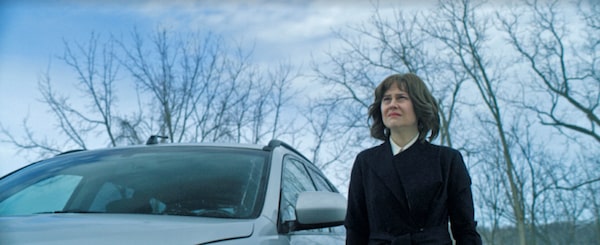
Marlene is inspired by the true case of Steven Truscott, wrongfully convicted of a murder he did not commit, as seen through the eyes of his wife Marlene.Courtesy of Vortex Media / Courtesy of Route 504
Plan your screen time with the weekly What to Watch newsletter. Sign up today.
Marlene
Directed by Wendy Hill-Tout
Written by Wendy Hill-Tout and Cathy Ostlere
Starring Kristin Booth, Greg Bryk and Julia Sarah Stone
Classification N/A; 110 minutes
Opens in select theatres April 8
Marlene Truscott spent her lifetime fighting to exonerate her husband Steven’s name, who was wrongly accused at age 14 of raping and murdering his young classmate, Lynne Harper, and served 10 years in jail for a crime he did not commit. Steven Truscott’s case is a landmark one in Canadian history, as the young man narrowly evaded the death penalty in 1959 after a lawyer wanted to try him as an adult. The case remains unsolved to this day.
There have been many notable artistic adaptations of Truscott’s story, including Murray Markowitz’s 1975 narrative drama Recommendation for Mercy, Ann-Marie MacDonald’s 2003 novel The Way the Crow Flies and a Blue Rodeo song simply called Truscott.
Marlene, a new Canadian biopic by director and co-writer Wendy Hill-Tout, wants to tell a new side of the story, the one about a wife who spent 49 years scouring files and autopsy reports to challenge the shoddy detective work done at the time of her husband’s case. It is an unintentionally fitting tribute to Marlene’s endurance: a film so stupefying dull, you’ll feel like you spent 49 years experiencing these events, too.
Taking us through the decades with badly rendered hair and makeup, the film explains how Marlene first became besotted with Steven as a young woman after reading Isabel LeBourdais’s bestselling book The Trial of Steven Truscott, which led to a correspondence while he was still in prison. After Steven was released, the couple fell in love and started a family in Vancouver, all while living under new names and identities.
Marlene chronicles the early infancy of Marlene and Steven’s romance through sepia-toned sixties flashbacks (an excellent Julia Sarah Stone and Dempsey Bryk, the son of lead actor Greg Bryk, play the couple in their early 20s, while Kristin Booth and Greg Bryk play them later on), leading to their final moment of legal victory in the late-aughts.

Marlene chronicles the early infancy of Marlene and Steven’s romance through sepia-toned sixties flashbacks, leading to their final moment of legal victory in the late-aughts.Courtesy of Vortex Media / Courtesy of Route 504
What plagues Marlene is the nagging feeling that justice was not served for the father of her children. The family kept a low profile until 2000, when they filmed a report on CBC’s The Fifth Estate, reviving interest in the case. They eventually filed an appeal in 2006, leading to Steven Truscott being acquitted of all charges in 2007.
That’s a great story, worthy of a writer/director who understands the immense emotional toll a legal undertaking such as this can have on a marriage and a family, when a father has been wrongfully accused and imprisoned of rape and murder at a formative age. Unfortunately, Marlene refuses to go anywhere interesting.
This is a film with all the trappings of low-budget Canadiana: from the murky Heritage Minute-lensing, to stage makeup better befitting a high-school production of Our Town, to placid acting by the film’s two leads, who play Steven and Marlene Truscott by always hitting the same note of staid sentimentality (Bryk) mixed with Lifetime movie hysteria (Booth). Scenes happen on the living-room couch, with Marlene and Steven clutching each other in matching cardigans. Considering its explosive subject matter, it’s surprising how little conflict there is in frequent scenes between the couple, resulting in a movie so bland and white, it can sometimes feel as if a Land’s End catalogue has come to life.
While wanting to create an obsessive procedural (à la Erin Brockovich) that credits Marlene as the real hero behind the scenes (a few montages that show Marlene working with a journalist to reinvestigate the original case files are fun to watch), Hill-Tout and her co-writer Carol Ostere refuse to build any tension between the Truscott’s, their children, or any of the reporters they meet along the way. Almost everything feels painfully limited in scope by budgetary set-ups and pandemic filmmaking – a kitchen-sink drama that rarely leaves the kitchen sink.
Touted in its press materials as being a story that centres Marlene’s story with female creatives at the helm, Marlene is anything but. Sure, frequent close-ups of Booth shuffling Post-it notes around a corkboard indicate she’s obsessed with clearing her husband’s name, but little is learned about her personhood. She has no female friends or any family to talk to, and no outside hobbies or interests, aside from her obsessive fixation on the case.
It’s a shame because there is a vibrant, messy and less picture-perfect version of Marlene that should’ve been made instead: one that examines the surely complicated love story at its heart.
There are plenty of compelling, true-to-life Canadian stories that deserve great, multi-faceted screen adaptations. Unfortunately, if we keep making movies such as Marlene, we won’t get the chance to do so.
Special to The Globe and Mail